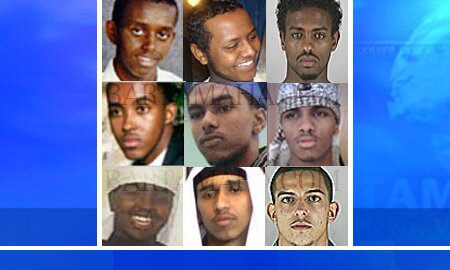 Mohamoud Hassan, 23, was an engineering student who went to Somalia last November. He had been helping care for his grandmother.
Mohamoud Hassan, 23, was an engineering student who went to Somalia last November. He had been helping care for his grandmother.
A fifth Somali man from Minneapolis apparently has been killed in his war-ravaged homeland, a relative said Friday.
Mohamoud Hassan, a 23-year-old former engineering student at the University of Minnesota, reportedly died in the past day or two.
“It’s real bad news,” Hassan’s uncle said Friday night. “But that is what happened.”
The uncle, who did not want to be identified, said he didn’t know when Hassan was killed, but added that “it’s very recent. Today or last night.”
The circumstances of Hassan’s death were not immediately known.
Abdirizak Bihi, a community activist who visited with Hassan’s grandmother on Friday, said she learned of her grandson’s fate after receiving a phone call from a relative of another young Somali-American who left his home in the Twin Cities last summer to return to Somalia to fight.
That man had told his relatives in a phone conversation shortly after noon Friday that he was standing in a cemetery in Mogadishu and had buried Hassan.
FBI spokesman E.K. Wilson said he could not confirm Hassan’s death.
By late Friday, however, friends and relatives of Hassan’s family had gathered at his grandmother’s apartment in the Cedar-Riverside neighborhood to extend condolences.
Bihi said relatives of several other families who had lost sons this past summer in Somalia also were there to offer support, including his sister, Zienab Bihie, whose son, Burhan Hassan, 18, was killed in June.
“It reminds me of bad days, yeah,” said Zienab Bihie, who often met with Hassan’s grandmother and parents of other young men who abruptly left Minneapolis to return to Somalia. “It’s very hard. They said ‘He’s gone.’”
Hassan is believed to be one of as many as 20 young men from the Twin Cities who over the past 2 1/2 years returned to their native country to train with and fight for al-Shabaab, a group designated by the U.S. government as a terrorist organization linked to al-Qaida.
Who recruited the men and who financed their travel has been at the heart of a far-reaching federal investigation that became public last November after Shirwa Ahmed, 26, a former college student from Minneapolis, blew himself up in Somalia in a coordinated attack that killed up to 30 people.
Under federal law, it is illegal for a U.S. citizen to go to another country and fight in a conflict, or support terrorists.
Since Ahmed’s death, Hassan and three other Somali men from Minneapolis who were friends or knew each other from a local mosque — Burhan Hassan, 18; Jamal Bana, 20, and Zakaria Maruf, 30 — have been killed in Somalia.
At the same time, three other Somali-American men have pleaded guilty to terror-related charges and await sentencing in U.S. District Court in Minneapolis for their role in returning to their homeland to train or fight.
As they wait, a federal grand jury in Minneapolis continues to hear testimony in the case, which is expected to lead to more charges or indictments in coming months.
Hassan, nicknamed “Snake,” was a graduate of Roosevelt High School in Minneapolis and was attending the U at the time he left for Somalia last November.
While at the U, Hassan served as vice president of the Minnesota Somali Student Union, said a friend, who asked not to be identified.
At the time of his departure, he was studying engineering and had lived off and on with an uncle while helping to care for his grandmother, who Bihi described as “very fragile.
“He was the No. 1 support for her,” Bihi said. “He was the caregiver. He would help her with her medications and make sure she was socializing with the elders.”
Hassan was part of a second wave of Somali-Americans from the Twin Cities to return to Somalia to fight in the country’s civil war. Several of the men who have pleaded guilty to terror-related charges left months earlier, and have told investigators that they initially were motivated to return to fight Ethiopians who had invaded their homeland.
One of Hassan’s friends said Friday that Hassan also was partly inspired to return because of the stories of rape and killings by Ethiopians.
But just what transpired while Hassan was in Somalia or what his involvement was with al-Shabaab wasn’t clear, the friend said.
Source: Star Tribune
By RICHARD MERYHEW






